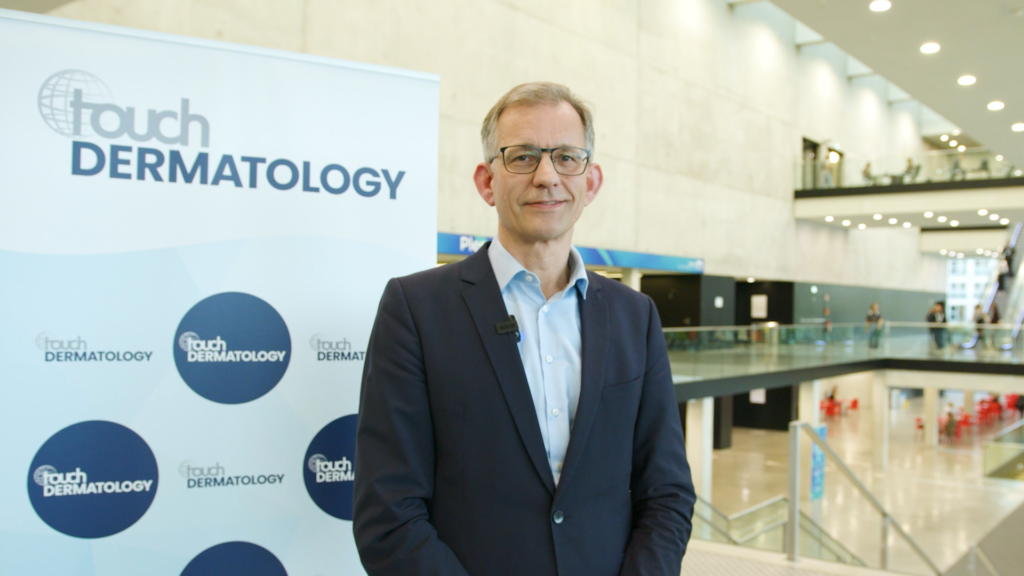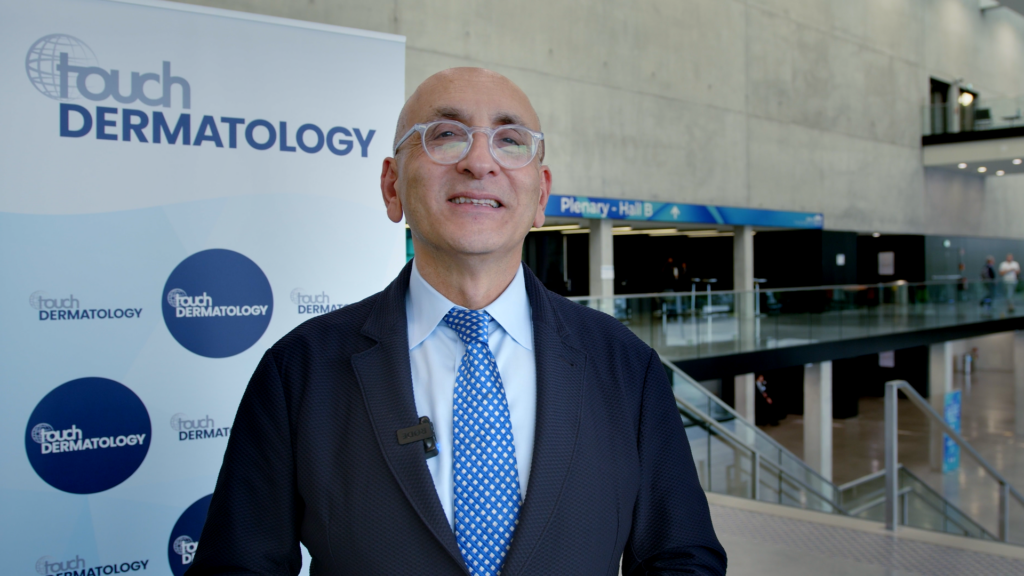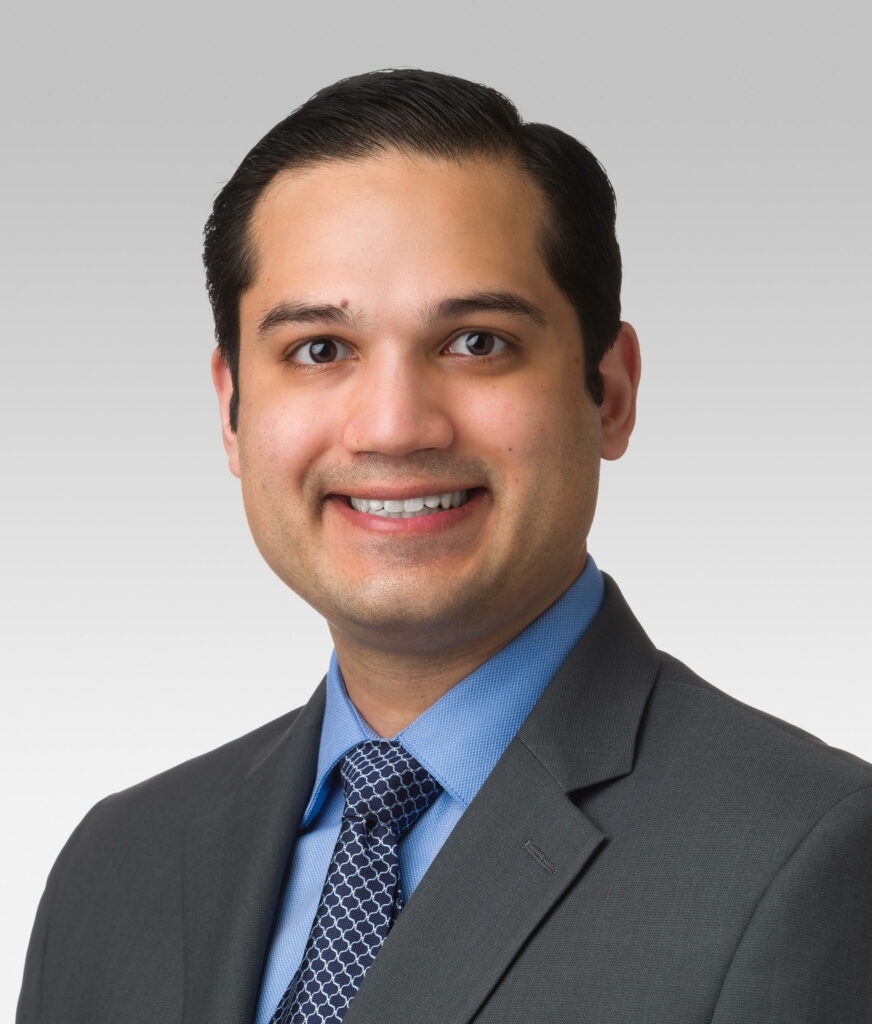Psoriasis
An Introduction to Psoriasis
Psoriasis is a common, chronic, inflammatory skin disease that can also affect the joints. Management involves topical and systemic medication and phototherapy. In the past decade, increased understanding of the pathophysiology of autoimmune diseases has resulted in the development of systemic biologic therapies for moderate-to-severe disease, including inhibitors of tumour necrosis factor alpha and the interleukins (IL) IL-12, IL-23, and IL-17A. Topical medications, including corticosteroids, vitamin D analogues, calcineurin inhibitors and keratolytics, are the mainstay treatment for mild-to-moderate psoriasis. Other therapies recently approved for psoriasis include tapinarof, a topical aryl hydrocarbon receptor modulating agent, and deucravacitinib, an oral tyrosine kinase 2 inhibitor.

The FDA recently approved roflumilast 0.3% foam for the treatment of plaque psoriasis of the scalp and body in both adolescents and adults. To better understand how this newly approved therapy fits into clinical practice, what the data show and which patients are likely to benefit, we spoke with Dr Jennifer Soung (Harbor University of California, Los Angeles and Southern California Dermatology, Santa Ana, CA, USA), a key investigator on the phase 3 ARRECTOR trial.

This year, we are celebrating our inaugural touchDERMATOLOGY Future Leaders to recognize the outstanding talent that has entered our field in recent years. These individuals are set to innovate and transform dermatology in the years to come. Representing a diverse range of expertise from across the globe, these highly accomplished clinicians are among the brightest minds shaping the future of dermatology. We had the pleasure of learning about their unique career journeys, motivations, and the inspirations that have guided their paths. They also shared their perspectives on the most exciting developments in dermatology today, along with their hopes for the future of the field. Congratulations to all our touchDERMATOLOGY Future Leaders, and thank you for sharing your stories, insights and ambitions with us.

Dr Tashmeeta Ahad is helping to push the boundaries of modern dermatology. Based in Vancouver, she is a Clinical Assistant Professor at the University of British Columbia and a clinician-scientist at the Photomedicine Institute, where her work spans photosensitivity disorders, laser and phototherapy, and innovative optical biopsy techniques for skin cancer monitoring. In this Future Leader 2025 Q&A, Dr Ahad shares how her global training journey, early mentors, and the visual complexity of dermatology have shaped her career—and why imaging technologies are opening new possibilities for patient care.

Dr Corinne Maiolo is based in Adelaide, where she treats both adult and paediatric patients, with particular interests in acne, rosacea, eczema, psoriasis, and hair loss. She is the founder of myPRODERM and was awarded the La Roche-Posay Research Grant in 2024 for her work in atopic dermatitis. In this Q&A, Dr Corinne Maiolo reflects on the moments that have shaped her career and shares her hopes for the future of dermatological care.

Physician burnout is at a critical point. In this episode, Nicky speaks with Dr Alfred Atanda about why so many physicians are burning out and what can be done to change the trend. From personal experience to system-wide solutions, Dr Atanda shares valuable insights on improving physician well-being and building a more effective healthcare culture.

Dr Raj Chovatiya presents key late-breaking data from AAD 2025 in atopic dermatitis and psoriasis, focusing on ESK001, icotrokinra, and rocatinlimab. He offers expert insights into the clinical relevance of these findings and explores what they could mean for future treatment approaches in dermatological practice.

Dr. Shari Lipner is a leading expert in dermatology, best known for her specialization in nail disorders. As an Associate Professor of Clinical Dermatology and Director of the Nail Division at New York-Presbyterian/Weill Cornell Medical Center, her work bridges ...

Recent developments regarding ESK-001, an oral, highly selective TYK2 inhibitor being developed for moderate-to-severe plaque psoriasis, were presented at EADV 2024. TYK2 plays a crucial role in the cell signalling through cytokines such as IL-23 and IL-12, both of which are key players in the pathogenesis of psoriasis. ESK-001 aims to inhibit these pathways to offer an effective treatment option for patients. The STRIDE (NCT05600036) study, a phase 2 randomized, placebo-controlled trial, has already shown promising, dose-dependent efficacy, and the ongoing open-label extension study is assessing its long-term safety and effectiveness.

GUIDE is a phase 3b randomized, parallel-group, double-blind trial investigating guselkumab for the treatment of moderate-to-severe psoriasis (NCT03818035). We were delighted to speak with Prof. Knut Schäkel (University Hospital Heidelberg, Germany) to discuss the clinical data already supporting GUS from GUIDE 1 and 2, and the rationale, methodology and findings from GUIDE part 3, which were presented at EADV. The abstract 'Treatment-free period of more than 1 year in guselkumab super responders with short disease duration of psoriasis: withdrawal data from the GUIDE trial' (Abstract N°: 2042) was presented at EADV 2023, Berlin, 11-14 October 2023 #EADVCongress. Questions What were the aims, design and eligibility criteria of the Phase 3b GUIDE trial? (0:16) What data from GUIDE 1 and 2 already supports early intervention with GUS? (1:28) Could you describe the rationale and methodology of GUIDE part 3? (2:19) What were the clinical endpoints and how well were these achieved? (3:10) What significance do these findings have in terms of maintenance of response following GUS withdrawal? (4:06) Disclosures: Knut Schäkel has been an advisor and/ or received speakers' honoraria and/ or received grants and/ or participated in clinical trials of the following companies: AbbVie, Almirall, Antabio, Boehringer Ingelheim, Celgene, Eli Lily, Galderma, Janssen-Cilag GmbH, LEO Pharma, Novartis, Pfizer and UCB Pharma. Support: Interview and filming supported by Touch Medical Media Ltd. Interview conducted by Victoria Jones and Katey Gabrysch. Filmed in coverage of the EADV Annual Meeting. This content was developed by Touch Medical Media and is not affiliated with the European Academy of Dermatology & Venereology (EADV) or the congress. Click here for more content on psoriasis & for further EADV 2023 highlights visit here.

The POETYK PSO long term extension (LTE) study investigated the efficacy and safety of deucravacitinib at 3 years in patients with plaque psoriasis (NCT04036435). touchDERMATOLOGY were delighted to speak with Dr. Leon. Kircik around the mechanism of action of deucravacitinib, the clinical data supporting its use in clinical practice, and the long term efficacy and safety data from the POETYK PSO LTE. This information is provided solely by Touch Medical Media and is independent of any sponsorship or affiliation with the European Academy of Dermatology & Venereology (EADV). Questions What is the mechanism of action of deucravacitinib? (0:21) What clinical evidence already supports the use of deucravacitinib? (0:41) What were the findings from the POETYK PSO long-term extension trial? (1:25) How will these insights optimise the use of deucravacitinib in plaque psoriasis? (2:10) In which patients is deucravacitinib most beneficial? (2:43) Support: Interview and filming supported by Touch Medical Media Ltd. Interview conducted by Victoria Jones and Katey Gabrysch. Filmed in coverage of the EADV Annual Meeting. This content was developed by Touch Medical Media and is not affiliated with the European Academy of Dermatology & Venereology (EADV) or the congress.

Effisayil 1 (NCT03782792) was a randomised, double-blind, placebo-controlled phase 2 study that investigated the efficacy and safety of spesolimab in generalized pustular psoriasis (GPP). touchIMMUNOLOGY were delighted to speak with Dr. Claudia De La Cruz (Clínica Dermacross, Santiago, Chile) to discuss ...

TouchDERMATOLOGY coverage from AAD 2023: Personalised medicine utilises biomarkers to predict patient outcomes and responses to treatment, ensuring that patients get the most effective treatment quicker. We were delighted to speak to Expert Faculty member Dr. William Damsky (Yale School of ...

TouchDERMATOLOGY & TouchIMMUNOLOGY coverage from AAD 2023: Ixekizumab is a humanized monoclonal antibody currently approved in patients with moderate-to-severe plaque psoriasis. We caught up with Dr Alan Menter (Baylor University Medical Center, Dallas, TX, USA) to discuss the aims, design, inclusion ...

Janus kinase inhibitors (JAKis) have transformed the landscape of dermatological therapy over the last 2 years, with six United States Food and Drug Administration approvals and further clinical trials in progress.1 JAKis have proven highly efficacious in dermatological diseases, by blocking ...
Latest articles videos and clinical updates - straight to your inbox
Log into your Touch Account
Earn and track your CME credits on the go, save articles for later, and follow the latest congress coverage.
Register now for FREE Access
Register for free to hear about the latest expert-led education, peer-reviewed articles, conference highlights, and innovative CME activities.
Sign up with an Email
Or use a Social Account.
This Functionality is for
Members Only
Explore the latest in medical education and stay current in your field. Create a free account to track your learning.




